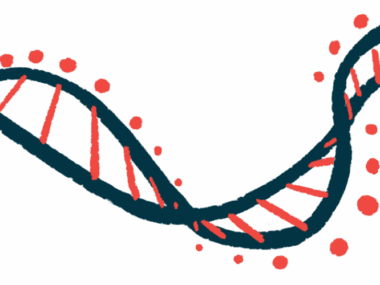Arrakis’ RNA-targeted oral therapies showing promise for DM1
Treatment found to ease symptoms in mouse model of the disease
Written by |

Arrakis Therapeutics’ investigational RNA-targeted small molecule (rSM) therapies were found to work as intended in preclinical studies and eased symptoms in a mouse model of myotonic dystrophy type 1 (DM1).
The company presented the findings at the Cell Symposia: Chemical Biology in Drugging the Undrugged conference, held earlier this week in San Francisco.
“We are pleased to share data on our DM1 program,” Jennifer Petter, PhD, founder and chief scientific officer at Arrakis, said in a company press release. “… our rSMs have the potential to address the full systemic manifestations of the disease and represent a new class of genetic medicine that use small molecules to directly address the genetic basis of disease.”
RNA is a template produced when DNA information is used to make protein
RNA is a template molecule that’s produced when the information in DNA is being used to make protein. Specifically, mutations that cause DM1 lead to the production of a DMPK RNA transcript that’s abnormally long because of the excessive repetition of three building blocks — a cytosine (C), a uracil (U), and a guanine (G) — in a certain part of the molecule.
This abnormal DMPK RNA molecule clumps in cells and isolates proteins important for an RNA processing step called splicing. When those splicing factors aren’t available, the production of many proteins is disturbed, leading to changes in muscle cells that drive the hallmark symptom of myotonia, where muscles are unable to relax after they contract.
The rSMs, designed with Arrakis’ proprietary drug development platform, are intended to target this disease-driving RNA.
Arrakis is working on developing oral small molecules that specifically bind to the CUG repeats in DMPK RNA, preventing the molecules from clumping. That’s expected to free important splicing factors that are needed for normal protein production, thereby easing myotonia and other symptoms.
“From the beginning, we have believed in the power of targeting RNA…,” said Michael Gilman, PhD, Arrakis’s CEO. “rSMs combine the specificity, validation, and impact of genetic medicines with the well understood benefits of small molecule drugs, including systemic biodistribution, oral delivery, and more streamlined and cost-efficient supply chains.”
The recent presentation included data from a number of preclinical studies showing that the company’s rSM molecules could work as expected. Results from these experiments showed multiple different rSM candidates were able to bind to the CUG repeats and free a splicing factor called MBNL1 from the protein clumps in a dose-dependent manner.
In DM1 patient-derived muscle cells, the rSMs were able to neutralize the abnormal mRNA clumps and correct splicing defects.
Similar benefits to splicing were observed in a mouse model of DM1. There, the treatments were also able to ease symptoms of myotonia, reducing the time it took for muscles to relax after they were stimulated.
Arrakis indicated the methods used to develop the therapeutic candidates for DM1 are also being used to advance a pipeline of therapies for other diseases.
“With our platform now built and scaled, we look forward to advancing our pipeline and vastly expanding the reach of RNA-targeted medicines,” Gilman said.






